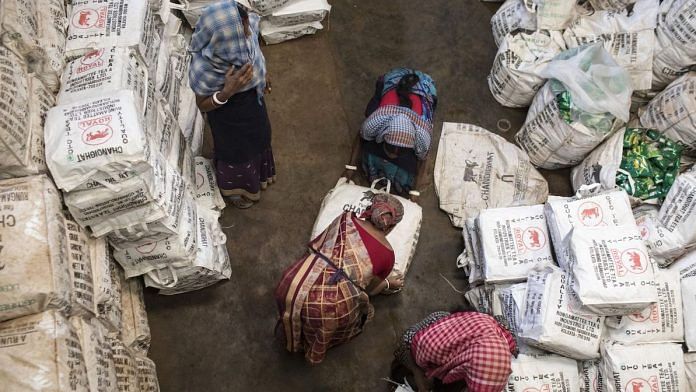New Delhi: Interest-free working capital, wage payment support, further extension of the 3-month loan moratorium, deadline relief for GST payment, and credit guarantees — these are some of the measures that are being finalised by the central government and the Reserve Bank of India (RBI) to provide relief to micro, small and medium enterprises (MSMEs) hit by the Covid-19 pandemic and lockdown, ThePrint has learnt.
The package could be announced as early as next week, government officials told ThePrint. However, the size of the relief package is still being debated.
“Given the government’s tight fiscal space, the Prime Minister’s Office, in consultation with the finance ministry, is currently assessing how much it can spare to meet the MSMEs’ immediate requirement,” a senior government official said.
“An announcement on the government’s interventions can come as early as next week.”
Emails sent to the Union finance ministry and the RBI, the country’s central bank, seeking comment remained unanswered at the time of publishing.
The MSME sector has been severely hit by the over-month-long countrywide lockdown enforced on 25 March to curtail the spread of Covid-19.
Many small firms have been forced to shut down, leaving multitudes without any jobs or sources of income.
According to the 73rd round of the National Sample Survey (NSS) conducted during the period 2015-16, there were an estimated 6.3 crore unincorporated non-agricultural MSMEs in the country engaged in different economic activities, creating 11.10 crore jobs in rural and urban areas.
Also Read: Covid-19 crisis is choking India’s MSME sector. Business won’t pick up even after lockdown
What is in the works?
Among other things, the central government is looking at ways to ensure small and medium enterprises pay the wages due to their workers.
“There could be some kind of wage support that could be given. Discussions are on between the PMO and finance ministry officials to see how it can be done,” a second government official said.
The options being explored include dipping into a part of the corpus under the Employees State Insurance (ESI) scheme — part of the social security framework for workers in the organised sector — to pay wages.
“This could be for companies that are registered with the ESI. A final decision is, however, yet to be taken,” said the official.
The government is also weighing a further extension of the three-month loan moratorium period beyond 31 May for these firms. In March, the RBI had announced that term-loan borrowers could defer loan repayments for a period of three months, a move meant to ease the impact of the lockdown.
The central government is also looking to provide interest-free working capital to small businesses to help them restart.
“They need cash to run and currently don’t have much as most of them work on credit,” the second official said. “Because of the lockdown, and production coming to a stop, these businesses have not got the dues for the goods they have supplied.”
Another problem the government is grappling with is facilitating higher credit flow to the MSME sector. Even though the RBI has slashed policy rates to as low as 4.4 per cent to encourage banks to lend, lenders have been reluctant to do so because of a heightened sense of risk aversion, triggered by what is seen as a witchhunt by investigative agencies and the overall gloomy economic outlook.
“Banks are worried that the loans that they give will become NPAs (non-performing assets). We are trying to assess and… find a way forward,” the official said.
The government also sees a possible helpline in the credit guarantee fund trust for micro and small enterprises (CGTMSE) to allay the funds flow problem. The trust fund was envisaged to encourage banks to lend without fearing default.
The CGTMSE provides a default guarantee between 50 and 85 per cent of the loan, depending on the size of the debt and nature of the business.
The hitch is that the corpus currently has only Rs 10,000 crore, which is likely to be insufficient.
“In the 2019-20 fiscal, the government gave credit guarantee of over Rs 45,000 crore to micro and small enterprises, when there was no Covid-19 outbreak. Now, the requirement will be many times more,” the official said.
Some of these recommendations were also proposed by senior Congress leader and former finance minister P. Chidambaram earlier this week as he sought urgent interventions to protect the sector.
Other initiatives on the government’s radar include extending the deadline for GST (goods & services tax) payment, a demand MSMEs have already raised.
The central government could also ask state governments and municipal bodies to bear some of the cost incurred by the MSMEs on electricity dues, and help them clear their inventory.
“These are not huge expenses, but, currently, for the cash-strapped MSMEs, it is getting difficult to even clear their pending energy bills. The state government will have to lend some support,” the official said.
Also Read: Modi govt plans stimulus for MSMEs and unorganised sector, but no ‘big bang’ package likely
Why the delay in announcement of the package
The first official quoted above said the government was treading cautiously with respect to relief packages because it does not know how the current pandemic will pan out.
“We don’t know what the situation will be after the next two months and what the requirement will be then,” the official added. “Whether the situation will return to normal or there will be more disruptions because of the virus. The government is weighing the various pros and cons before deciding how much to give for the package,” the official said.
ThePrint had reported last month that fiscal constraints mean the government will bring in sector-specific interventions for targeted sectors with a limited package size, but a big-bang package was unlikely.
Also Read: Loyalty and performance: Why Modi appointed trusted men to helm crucial ministries amid Covid




How do you consider micro enterprises with less than 8 emplyees not c0vrred inder ESI